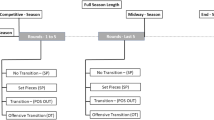Abstract
Recently, most clubs in the highest Belgian football division have become convinced that the format of their league should be changed. Moreover, the TV station that broadcasts the league is pleading for a more attractive competition. However, the clubs have not been able to agree on a new league format, mainly because they have conflicting interests. In this paper, we compare the current league format, and three other formats that have been considered by the Royal Belgian Football Association. We simulate the course of each of these league formats, based on historical match results. We assume that the attractiveness of a format is determined by the importance of its games; our importance measure for a game is based on the number of teams for which this game can be decisive to reach a given goal. Furthermore, we provide an overview of how each league format aligns with the expectations and interests of each type of club.
Similar content being viewed by others
References
Audas, R., Dobson, S., & Goddard, J. (2002). The impact of managerial change on team performance in professional sports. Journal of Economics and Business, 54(6), 633–650.
Bartsch, T., Drexl, A., & Kroger, S. (2006). Scheduling the professional soccer leagues of Austria and Germany. Computers and Operations Research, 33(7), 1907–1937.
Bojke, C. (2007). The impact of post-season play-off systems on the attendance at regular season games. In J. Albert, & R.H. Koning (Eds.), Statistical thinking in sports (pp. 179–202).
Colin, F. (2007). AA Gent en Charleroi leiden verzet tegen competitiehervorming. De Standaard, October 24th (in Dutch).
de Werra, D. (1980). Geography, games and graphs. Discrete Applied Mathematics, 2(4), 327–337.
Della Croce, F., & Oliveri, D. (2006). Scheduling the Italian Football League: an ILP-based approach. Computers and Operations Research, 33(7), 1963–1974.
De Vos, G. (2008a). De kronkels van de competitiehervorming. De Standaard, March 19th (in Dutch).
De Vos, G. (2008b). Misbaksel. De Standaard, March 22nd (in Dutch).
Dixon, M., & Coles, S. (1997). Modelling association football scores and inefficiencies in the football betting market. Applied Statistics, 46, 265–280.
Dixon, M., & Pope, P. (2004). The value of statistical forecasts in the UK association football betting market. International Journal of Forecasting, 20, 686–700.
Durán, G., Guajardo, M., Miranda, J., Sauré, D., Souyris, S., & Weintraub, A. (2007). Scheduling the Chilean Soccer League by integer programming. Interfaces, 37, 539–552.
Forrest, D., & Simmons, R. (2000). Forecasting sport: the behaviour and performance of football tipsters. International Journal of Forecasting, 16, 317–331.
Geril, J. (2008a). Competitie met 16 goedgekeurd. De Standaard, May 19th (in Dutch).
Geril, J. (2008b). Naar een competitie met 16. De Standaard, January 18th (in Dutch).
Goddard, J. (2005). Regression models for forecasting goals and match results in association football. International Journal of Forecasting, 21, 331–340.
Goddard, J., & Asimakopoulos, I. (2004). Forecasting football match results and the efficiency of fixed-odds betting. Journal of Forecasting, 23, 51–66.
Goossens, D., & Spieksma, F. (2009). Scheduling the Belgian soccer league. Interfaces, 39(2), 109–118.
Goossens, D., Beliën, J., & Spieksma, F. (2008). Comparing league formats with respect to match unimportance in Belgian football. In Proceedings of the 7th international conference on the practice and theory of automated timetabling (PATAT 2008), Montréal (Canada), August 18–22.
Griggs, T. S., & Rosa, A. (1996). A tour of European soccer schedules, or testing the popularity of GK 2n . Bulletin of the Institute of Combinatorics and its Applications, 18, 65–68.
Hauspie, J. (2007). Het plan-Wijnants voor de hervorming van de Jupiler League: simpele rekensom. Sport Voetbalmagazine, 7(48), 24–25 (in Dutch).
Jennett, N. (1984). Attendances, uncertainty of outcome and policy in Scottish league football. Scottish Journal of Political Economy, 31, 176–198.
Karlis, D., & Ntzoufras, I. (2003). Analysis of sports data by using bivariate Poisson models. Statistician, 52, 381–393.
Kelton, W. D., Sadowski, R. P., & Sadowski, D. A. (2002). Simulation with arena. New York: McGraw-Hill.
Kendall, G. (2008). English football fixtures over holiday periods. Journal of the Operational Research Society, 59, 743–755.
Kendall, G., Knust, S., Ribeiro, C. C., & Urrutia, S. (2010). Scheduling in sports: an annotated bibliography. Computers and Operations Research, 37, 1–19.
Koning, R. (2000). Balance in competition in Dutch soccer. Statistician, 49, 419–431.
Koning, R. (2007). Post-season play and league design in Dutch soccer. In P. Rodriguez, J. Garcia, & S. Kesenne (Eds.), League governance, competition and professional sports (pp. 183–207).
Koning, R., Koolhaas, M., Renes, G., & Ridder, G. (2003). A simulation model for football championships. European Journal of Operational Research, 148(2), 268–276.
McHale, I., & Scarf, P. (2006). Forecasting international soccer match results using bivariate discrete distributions. Working paper, Salford Business School.
Rasmussen, R. (2008). Scheduling a triple round robin tournament for the best Danish soccer league. European Journal of Operational Research, 185(2), 795–810.
Ribeiro, C., & Urrutia, S. (2005). An application of integer programming to playoff elimination in football championships. International Transactions in Operational Research, 12, 375–386.
Scarf, PA, & Shi, X. (2008). The importance of a match in a tournament. Computers and Operations Research, 35(7), 2406–2418.
Schilling, M. F. (1994). The importance of a game. Mathematics Magazine, 67(4), 282–288.
Silva, C., Garcia, E., & Saliby, E. (2002). Soccer championship analysis using Monte Carlo simulation. In E. Yücesan, C.H. Chen, J.L. Snowdon, & J.M. Charnes (Eds.), Proceedings of the winter simulation conference, 8–11 Dec. 2002 (Vol. 2, pp. 2011–2016).
Smyth, D. J., & Smyth, S. J. (1994). Major league baseball division standings, sports journalists’ predictions and player salaries. Managerial and Decision Economics, 15(5), 421–429.
Author information
Authors and Affiliations
Corresponding author
Rights and permissions
About this article
Cite this article
Goossens, D.R., Beliën, J. & Spieksma, F.C.R. Comparing league formats with respect to match importance in Belgian football. Ann Oper Res 194, 223–240 (2012). https://doi.org/10.1007/s10479-010-0764-4
Published:
Issue Date:
DOI: https://doi.org/10.1007/s10479-010-0764-4




